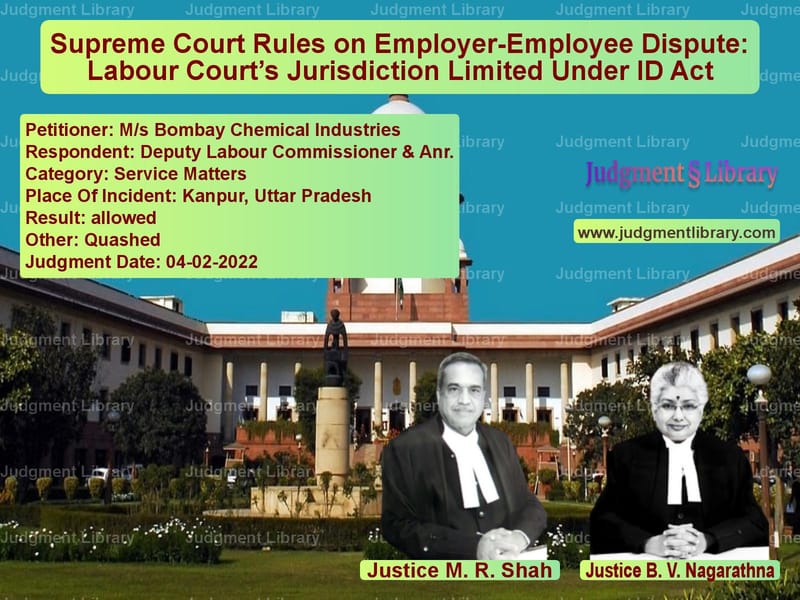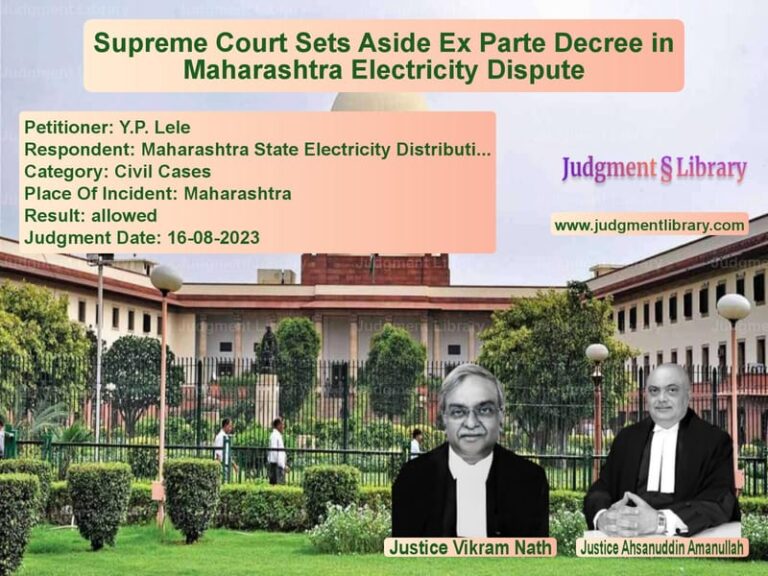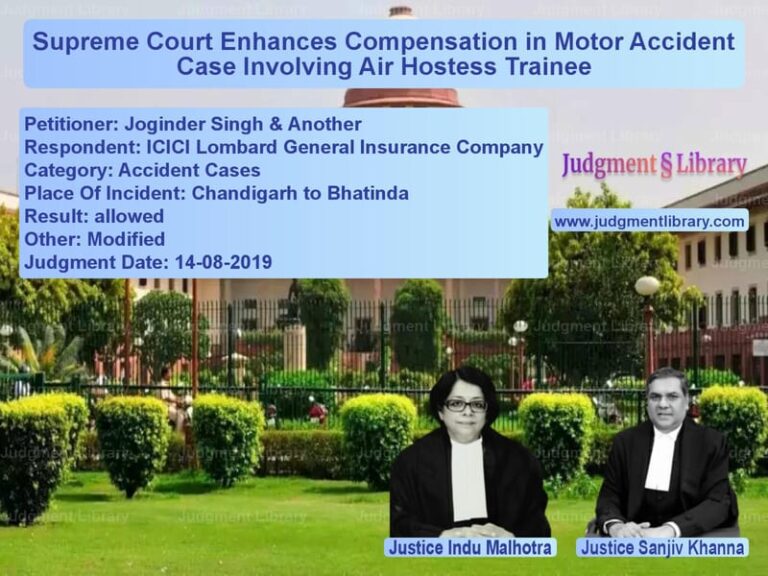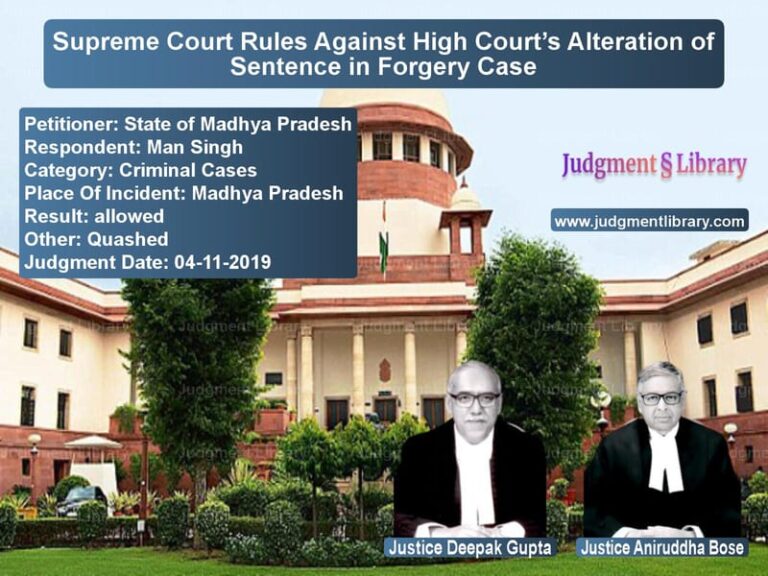Supreme Court Rules on Employer-Employee Dispute: Labour Court’s Jurisdiction Limited Under ID Act
The Supreme Court of India recently delivered a significant ruling in M/s Bombay Chemical Industries vs. Deputy Labour Commissioner & Anr., clarifying the scope of a Labour Court’s jurisdiction under Section 33(C)(2) of the Industrial Disputes Act, 1947. The judgment establishes that a Labour Court cannot adjudicate disputes about the existence of an employer-employee relationship in proceedings under Section 33(C)(2) and must instead direct the claimant to seek adjudication through proper reference under Section 10 of the Act.
Background of the Case
The dispute arose when Respondent No.2 filed an application before the Labour Court under Section 33(C)(2) of the Industrial Disputes Act, claiming unpaid wages for the period between April 1, 2006, and March 31, 2012. The appellant, M/s Bombay Chemical Industries, opposed the claim, denying the existence of any employer-employee relationship with Respondent No.2.
Key Developments:
- The respondent claimed that he was employed as a salesman by the appellant and was entitled to wage differentials.
- The appellant argued that Respondent No.2 was never engaged as an employee and that no employer-employee relationship existed between them.
- The Labour Court relied on documentary evidence submitted by Respondent No.2 (exhibits W-1 to W-6) and held that he was an employee.
- The Labour Court directed the appellant to pay the wage difference from April 1, 2006, to March 31, 2012.
- The appellant challenged this decision before the High Court of Allahabad through a writ petition.
- The High Court dismissed the writ petition, upholding the Labour Court’s decision.
- Dissatisfied with the outcome, the appellant approached the Supreme Court.
Petitioner’s Arguments (M/s Bombay Chemical Industries)
- The appellant argued that the Labour Court lacked jurisdiction under Section 33(C)(2) to determine whether Respondent No.2 was an employee.
- It contended that the existence of an employer-employee relationship was disputed, and such an issue should be adjudicated under Section 10 of the Industrial Disputes Act through a proper reference.
- Reliance was placed on past judgments, including Municipal Corporation of Delhi vs. Ganesh Razak and Union of India vs. Kankuben, to support the claim that a Labour Court cannot entertain disputed claims under Section 33(C)(2).
Respondent’s Arguments (Claimant)
- The respondent submitted that he had provided sufficient documentary evidence proving his employment.
- He argued that the appellant was attempting to evade paying his rightful dues by falsely denying the employer-employee relationship.
- The High Court had correctly upheld the Labour Court’s findings, and no interference was required.
Supreme Court’s Observations
- The Court observed that the Labour Court had exceeded its jurisdiction under Section 33(C)(2) by deciding on the employer-employee relationship.
- It emphasized that in a proceeding under Section 33(C)(2), the Labour Court functions as an executing court and cannot decide entitlement issues.
- The Court reiterated that in cases where the existence of an employment relationship is disputed, the appropriate remedy is to file a reference under Section 10 of the Industrial Disputes Act.
- It found that the High Court failed to consider these jurisdictional limits while upholding the Labour Court’s decision.
Key Excerpts from the Supreme Court Judgment
On the jurisdiction of the Labour Court under Section 33(C)(2):
“The Labour Court under Section 33(C)(2) acts like an executing court. It cannot adjudicate disputes of entitlement or the existence of an employer-employee relationship.”
On the necessity of prior adjudication:
“In cases where an employer denies the existence of an employment relationship, the Labour Court cannot assume jurisdiction. The workman must first seek reference under Section 10 of the Industrial Disputes Act.”
Final Verdict
- The Supreme Court quashed the orders of both the Labour Court and the High Court.
- It directed Respondent No.2 to seek proper adjudication of his claim through a reference under Section 10.
- The ruling clarified that a Labour Court cannot determine employment status in a Section 33(C)(2) proceeding.
Conclusion: Implications of the Judgment
This judgment has significant implications for labor law and industrial disputes:
- It limits the jurisdiction of Labour Courts under Section 33(C)(2) to cases where entitlement is already adjudicated.
- It reinforces that disputed employer-employee relationships must be adjudicated under Section 10 of the Industrial Disputes Act.
- The ruling prevents misuse of Section 33(C)(2) proceedings by ensuring proper adjudication before wage claims are enforced.
- It sets a precedent for future cases, ensuring that parties follow the correct legal process in labor disputes.
By reinforcing the limits of a Labour Court’s jurisdiction, the Supreme Court has provided clarity on the legal framework governing labor disputes, ensuring fair and lawful adjudication of claims.
Petitioner Name: M/s Bombay Chemical Industries.Respondent Name: Deputy Labour Commissioner & Anr..Judgment By: Justice M. R. Shah, Justice B. V. Nagarathna.Place Of Incident: Kanpur, Uttar Pradesh.Judgment Date: 04-02-2022.
Don’t miss out on the full details! Download the complete judgment in PDF format below and gain valuable insights instantly!
Download Judgment: ms-bombay-chemical-vs-deputy-labour-commis-supreme-court-of-india-judgment-dated-04-02-2022.pdf
Directly Download Judgment: Directly download this Judgment
See all petitions in Employment Disputes
See all petitions in Public Sector Employees
See all petitions in Contractual Employment
See all petitions in Recruitment Policies
See all petitions in Disciplinary Proceedings
See all petitions in Judgment by Mukeshkumar Rasikbhai Shah
See all petitions in Judgment by B.V. Nagarathna
See all petitions in allowed
See all petitions in Quashed
See all petitions in supreme court of India judgments February 2022
See all petitions in 2022 judgments
See all posts in Service Matters Category
See all allowed petitions in Service Matters Category
See all Dismissed petitions in Service Matters Category
See all partially allowed petitions in Service Matters Category







